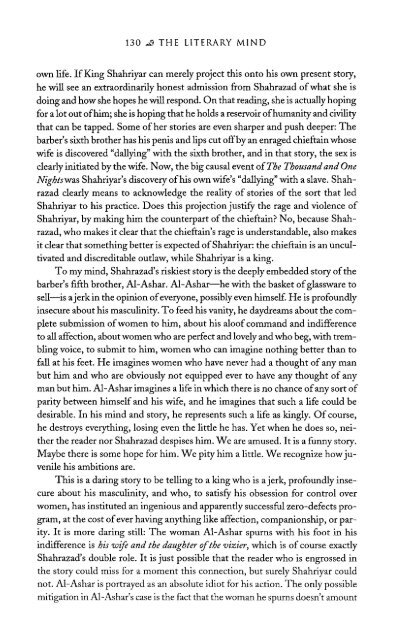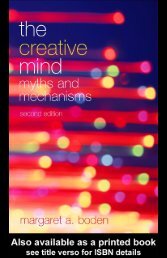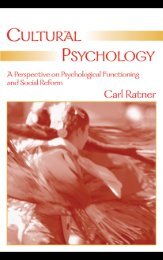The Literary Mind.pdf
The Literary Mind.pdf
The Literary Mind.pdf
Create successful ePaper yourself
Turn your PDF publications into a flip-book with our unique Google optimized e-Paper software.
130 THE LITERARY MIND<br />
own life. If King Shahriyar can merely project this onto his own present story,<br />
he will see an extraordinarily honest admission from Shahrazad of what she is<br />
doing and how she hopes he will respond. On that reading, she is actually hoping<br />
for a lot out of him; she is hoping that he holds a reservoir of humanity and civility<br />
that can be tapped. Some of her stories are even sharper and push deeper: <strong>The</strong><br />
barber's sixth brother has his penis and lips cut off by an enraged chieftain whose<br />
wife is discovered "dallying" with the sixth brother, and in that story, the sex is<br />
clearly initiated by the wife. Now, the big causal event of <strong>The</strong> Thousand and One<br />
Nights was Shahriyar's discovery of his own wife's "dallying" with a slave. Shahrazad<br />
clearly means to acknowledge the reality of stories of the sort that led<br />
Shahriyar to his practice. Does this projection justify the rage and violence of<br />
Shahriyar, by making him the counterpart of the chieftain? No, because Shahrazad,<br />
who makes it clear that the chieftain's rage is understandable, also makes<br />
it clear that something better is expected of Shahriyar: the chieftain is an uncultivated<br />
and discreditable outlaw, while Shahriyar is a king.<br />
To my mind, Shahrazad's riskiest story is the deeply embedded story of the<br />
barber's fifth brother, Al-Ashar. Al-Ashar—he with the basket of glassware to<br />
sell—is a jerk in the opinion of everyone, possibly even himself. He is profoundly<br />
insecure about his masculinity. To feed his vanity, he daydreams about the complete<br />
submission of women to him, about his aloof command and indifference<br />
to all affection, about women who are perfect and lovely and who beg, with trembling<br />
voice, to submit to him, women who can imagine nothing better than to<br />
fall at his feet. He imagines women who have never had a thought of any man<br />
but him and who are obviously not equipped ever to have any thought of any<br />
man but him. Al-Ashar imagines a life in which there is no chance of any sort of<br />
parity between himself and his wife, and he imagines that such a life could be<br />
desirable. In his mind and story, he represents such a life as kingly. Of course,<br />
he destroys everything, losing even the little he has. Yet when he does so, neither<br />
the reader nor Shahrazad despises him. We are amused. It is a funny story.<br />
Maybe there is some hope for him. We pity him a little. We recognize how juvenile<br />
his ambitions are.<br />
This is a daring story to be telling to a king who is a jerk, profoundly insecure<br />
about his masculinity, and who, to satisfy his obsession for control over<br />
women, has instituted an ingenious and apparently successful zero-defects program,<br />
at the cost of ever having anything like affection, companionship, or parity.<br />
It is more daring still: <strong>The</strong> woman Al-Ashar spurns with his foot in his<br />
indifference is his wife and the daughter of the vizier, which is of course exactly<br />
Shahrazad's double role. It is just possible that the reader who is engrossed in<br />
the story could miss for a moment this connection, but surely Shahriyar could<br />
not. Al-Ashar is portrayed as an absolute idiot for his action. <strong>The</strong> only possible<br />
mitigation in Al-Ashar's case is the fact that the woman he spurns doesn't amount















